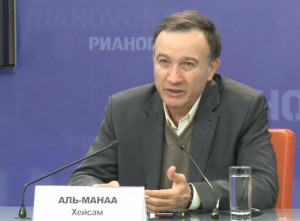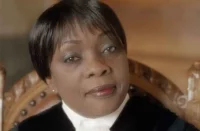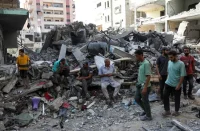On March 11 a delegation of the Syrian National Coordinating Committee for Democratic Change led by its Coordinator Heisam al-Manaa, visited Moscow to hold talks with top officials of Russian Ministry of Foreign Affairs. At the negotiations and while meeting Russian experts and media, Mr. Manaa confirmed there was no alternative to political solution of Syrian crisis on the basis of Geneva accords.

There are two belligerents in the confrontation. The Bashar Assad’s leadership supported by the major part of population (60% – 75% according to different sources), its law enforcement agencies, armed forces on the one side and armed formations waging terror campaign, predominantly radical Islamists, on the other. Many of them come from Muslim Arab states and European Muslim communities. Al Qaeda militants make up part of the opposition.
Internal, or patriotic opposition, enjoys some support. It doesn’t fully sees eye to eye with the government on a lot of issues, but is ready for a dialogue with Damascus and, generally speaking, is an ally of the government. The National Coordinating Committee is an important element of legal opposition. Its structure comprises 16 parties, including three Kurdish (the Kurds account for around 9% of the population of 23 million), as well as independent activists. The Committee is headed by Hassan Abdel Azim and Heisam Manaa.
To some extent the Committee’s local branches cooperate with the authorities. True the organization demands reforms, sometimes its supporters even clash with police during street protests. At that, the Committee’s defense armed formations protect living quarters from anti-government terrorist forces attacks. The Kurdish self-defence units are armed by the government.
The government enjoys general support in the country. The fact is supported by polls. Ammar Waqqaf, a patriotic opposition activist, has told Euronews TV channel about it. MotherAgnes-Miriam, mother superior of the Monastery of St James the Mutilated, one of the biggest ones in the country, has said Bashar Assad is supported by Syrian Christians. The Christian population is over 2 million.
There are many opposition groups abroad. The Syrian National Council based in Istanbul is headed by Abdul Basit Sida following the resignation of Burhan Ghalioun, a Syrian of French origin. It was the most prominent element of the abroad-based opposition since summer 2011 till November 2012. But the Council failed to carry out the missions assigned by NATO and the European Union: to unite the warring factions, capture part of the Syrian territory to make it possible for the West to recognize it as the legitimate government and justify a foreign intervention into Syria according to the Libyan scenario. The Council was torn by internal discords, some leaders left it, some members started to lash out against the West for «insufficient aid». Thanks to the efforts of the United States and the Persian Gulf monarchies, a number of opposition groups were united into the National Coalition for Syrian Revolutionary and Opposition Forces (commonly named the Syrian National Coalition – SNC) in Doha (Qatar) in November 2012. Prime Minister of Qatar, Turkish Minister of Foreign Affairs and US State Department officials were present giving direct instructions on filling top positions appointments. Former imam of the Umayyad Mosque in Damascus Moaz al-Khatib was elected the president of the coalition. Riad Seif and Suheir Atassi, both prominent democracy activists and the latter a secular feminist, were elected vice presidents. Mustafa Sabbagh was elected as the coalition’s secretary-general. The coalition has a council with about 63 seats, of which 22 are Syrian National Council members. The new organization is based in Cairo.
Not all opposition abroad groups recognize it. And there is no unity in the opposition abroad ranks. The only thing that unites it is the common goal of toppling Bashar Assad.
The Muslim brothers and other radical Sunni organizations are the most influential ones; they have their own armed formations waging terrorist activities on Syrian territory. There are a few terror radical Islamist groups in Syria supported from outside: Al Qaeda, Fatah al-Islam (Conquest of Islam), Junud al-Islam (Soldiers of Islam), Firaq Allah (Brigades of Allah), A Talia al-Mukatila (Fighting Vanguard), the military wing of Muslim brothers, Al-Nusra Front (The Support Front for the People of Syria), gangs of criminals…
In 2012-2013 these groups conducted terrorist activities in Homs, Idlib, Aleppo, Damascus, the death toll was hundreds of civilians… The training camps are situated in Jordan and Turkey. Special services of the United Sates and some Arab states are involved in training and arms supplies. The money comes from the Persian Gulf monarchies.
A string of international meetings and United Nations sessions have been devoted to the issue. The United Nations Security Council (Russia, the United States of America, the United Kingdom, France, China), Turkey, Kuwait, Iraq and Qatar foreign chiefs meeting in Geneva on June 30 2012 was the most productive one. The final document signed by all participants stressed the need for a transitional period and national dialogue.
When the National Coalition for Syrian Revolutionary and Opposition Forces was created under the aegis of NATO and the European Union in November 2012, the West and Turkey decided to recognize the new alliance as the sole legitimate representative of Syrian people. The haste strikes an eye, especially taking into consideration the fact that not all opposition abroad groups and the states fallen victims to the Arab Spring recognized the Coalition. One of 12 items in the Coalition’s program states the goal of Assad’s overthrow and refusal to hold any talks with the Syrian government. Even this gives enough ground to say the NATO members and the European Union directly violated the Geneva accords by recognizing the organization.
Addressing the nation on January 5 2013 Bashar Assad came out with a crisis management plan, that presupposes the termination of arms supplies to the anti-government forces, end of violence by all belligerents, the beginning of dialogue including all opposition groups, excluding the armed opposition, which he described as a “puppet made by the West.” The Russian Ministry of Foreign Affairs said «Syrian President Bashar Assad’s proposals for ending his country’s civil war should be taken into account by the international community». The ministry said as part of international efforts to help negotiate an end to Syria’s civil war “some of the ideas” could facilitate the crisis management based on the Geneva declaration. The European Union’s leadership said it would study the Assad’s peace plan. «Syrian President Bashar al-Assad’s recently proposed peace plan is far from reality and proves again that he must resign from his post», Victoria Nuland, a spokesperson for the US Department of State, said. «Bashar al-Assad’s speech today is yet another attempt by the regime to cling to power and does nothing to advance the Syrian people’s goal of a political transition. His initiative is detached from reality, undermines the efforts of Joint Special Representative Lakhdar Brahimi, and would only allow the regime to further perpetuate its bloody oppression of the Syrian people,» Nuland said in a statement. Still, probably remembering the death of us diplomats in Libya in September 2012, the United States included Al-Nusra Front, also referred to as Jabhat al-Nusra, one of the most extremist Syrian anti-government groups, into the terrorist organizations list.
The Israel’s stance on Syria is also going through some changes. On December 12 2012 Israeli Prime Minister Benjamin Netanyahu expressed concern over extremists coming to power in many countries of the region. In his turn, the President of Israel Shimon Peres said in March 2013 that the Syrian crisis was to be solved with the help of the Arab League of States. «The Arab League can and should form a provisional government in Syria to stop the massacre. UN should support the Arab League to build an Arab force in blue helmets», he told MEPs in Strasbourg, becoming the first Israeli head of state to address the chamber since Chaim Herzog 28 years ago.
The Russian stance has been confirmed many a time by Russian President and Minister of Foreign Affairs. The essence of it is giving the Syrian people a chance to decide their own fate without a foreign intervention.
Source: Strategic Culture Foundation














Comments